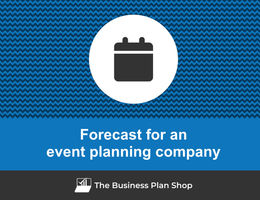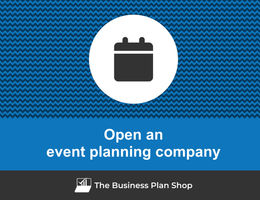How to write a business plan for an event planning company?

Writing a business plan for an event planning company can be an intimidating task, especially for those just starting.
This in-depth guide is designed to help entrepreneurs like you understand how to create a comprehensive business plan so that you can approach the exercise with method and confidence.
We'll cover: why writing an event planning company business plan is so important - both when starting up, and when running and growing the business - what information you need to include in your plan, how it should be structured, and what tools you can use to get the job done efficiently.
Let's get started!
Why write a business plan for an event planning company?
Being clear on the scope and goals of the document will make it easier to understand its structure and content. So before diving into the actual content of the plan, let's have a quick look at the main reasons why you would want to write an event planning company business plan in the first place.
To have a clear roadmap to grow the business
Running a small business is tough! Economic cycles bring growth and recessions, while the business landscape is ever-changing with new technologies, regulations, competitors, and consumer behaviours emerging constantly.
In such a dynamic context, operating a business without a clear roadmap is akin to driving blindfolded: it's risky, to say the least. That's why crafting a business plan for your event planning company is vital to establish a successful and sustainable venture.
To create an effective business plan, you'll need to assess your current position (if you're already in business) and define where you want the business to be in the next three to five years.
Once you have a clear destination for your event planning company, you'll have to:
- Identify the necessary resources (human, equipment, and capital) needed to reach your goals,
- Determine the pace at which the business needs to progress to meet its objectives as scheduled,
- Recognize and address the potential risks you may encounter along the way.
Engaging in this process regularly proves advantageous for both startups and established companies. It empowers you to make informed decisions about resource allocation, ensuring the long-term success of your business.
Need a convincing business plan?
The Business Plan Shop makes it easy to create a financial forecast to assess the potential profitability of your projects, and write a business plan that’ll wow investors.

To maintain visibility on future cash flows
Businesses can go for years without making a profit, but they go bust as soon as they run out of cash. That's why "cash is king", and maintaining visibility on your event planning company's future cash flows is critical.
How do I do that? That's simple: you need an up-to-date financial forecast.
The good news is that your event planning company business plan already contains a financial forecast (more on that later in this guide), so all you have to do is to keep it up-to-date.
To do this, you need to regularly compare the actual financial performance of your business to what was planned in your financial forecast, and adjust the forecast based on the current trajectory of your business.
Monitoring your event planning company's financial health will enable you to identify potential financial problems (such as an unexpected cash shortfall) early and to put in place corrective measures. It will also allow you to detect and capitalize on potential growth opportunities (higher demand from a given segment of customers for example).
To secure financing
Whether you are a startup or an existing business, writing a detailed event planning company business plan is essential when seeking financing from banks or investors.
This makes sense given what we've just seen: financiers want to ensure you have a clear roadmap and visibility on your future cash flows.
Banks will use the information included in the plan to assess your borrowing capacity (how much debt your business can support) and your ability to repay the loan before deciding whether they will extend credit to your business and on what terms.
Similarly, investors will review your plan carefully to assess if their investment can generate an attractive return on investment.
To do so, they will be looking for evidence that your event planning company has the potential for healthy growth, profitability, and cash flow generation over time.
Now that you understand why it is important to create a business plan for an event planning company, let's take a look at what information is needed to create one.
Need a convincing business plan?
The Business Plan Shop makes it easy to create a financial forecast to assess the potential profitability of your projects, and write a business plan that’ll wow investors.

Information needed to create a business plan for an event planning company
Drafting an event planning company business plan requires research so that you can project sales, investments and cost accurately in your financial forecast, and convince the reader that there is a viable commercial opportunity to be seized.
Below, we'll focus on three critical pieces of information you should gather before starting to write your plan.
Carrying out market research for an event planning company
Carrying out market research before writing a business plan for an event planning company is essential to ensure that the financial projections are accurate and realistic.
Market research helps you gain insight into your target customer base, competitors, pricing strategies and other key factors which can have an impact on the commercial success of your business.
In particular, it is useful in forecasting revenue as it provides valuable data regarding potential customers’ spending habits and preferences.
You may discover that customers are increasingly interested in eco-friendly event planning. This could include using recyclable materials, working with local vendors, and hosting events outdoors. Additionally, you might find that customers are more interested in interactive events. This could range from activities that encourage collaboration and networking to immersive experiences that create lasting memories.
This information can then be used to create more accurate financial projections which will help investors make informed decisions about investing in your event planning company.
Developing the marketing plan for an event planning company
Before delving into your event planning company business plan, it's imperative to budget for sales and marketing expenses.
To achieve this, a comprehensive sales and marketing plan is essential. This plan should provide an accurate projection of the necessary actions to acquire and retain customers.
Additionally, it will outline the required workforce to carry out these initiatives and the corresponding budget for promotions, advertising, and other marketing endeavours.
By budgeting accordingly, you can ensure that the right resources are allocated to these vital activities, aligning them with the sales and growth objectives outlined in your business plan.
The staffing and equipment needs of an event planning company
As you embark on starting or expanding your event planning company, having a clear plan for recruitment and capital expenditures (investment in equipment and real estate) is essential for ensuring your business's success.
Both the recruitment and investment plans must align with the timing and level of growth projected in your forecast, and they require appropriate funding.
A event planning company might incur staffing costs for event coordinators, catering personnel, and security personnel. They may also need to rent equipment such as tents, tables, chairs, and other supplies for the event. Additionally, they may need to rent or purchase audio/visual equipment such as microphones, speakers, and projectors.
To create a realistic financial forecast, you also need to consider other operating expenses associated with the day-to-day running of your business, such as insurance and bookkeeping.
With all the necessary information at hand, you are ready to begin crafting your business plan and developing your financial forecast.
Need a convincing business plan?
The Business Plan Shop makes it easy to create a financial forecast to assess the potential profitability of your projects, and write a business plan that’ll wow investors.

What goes into your event planning company's financial forecast?
The financial forecast of your event planning company's business plan will enable you to assess the growth, profitability, funding requirements, and cash generation potential of your business in the coming years.
The four key outputs of a financial forecast for a event planning company are:
- The profit and loss (P&L) statement,
- The projected balance sheet,
- The cash flow forecast,
- And the sources and uses table.
Let's look at each of these in a bit more detail.
The projected P&L statement
Your event planning company forecasted P&L statement enables the reader of your business plan to get an idea of how much revenue and profits your business is expected to make in the near future.
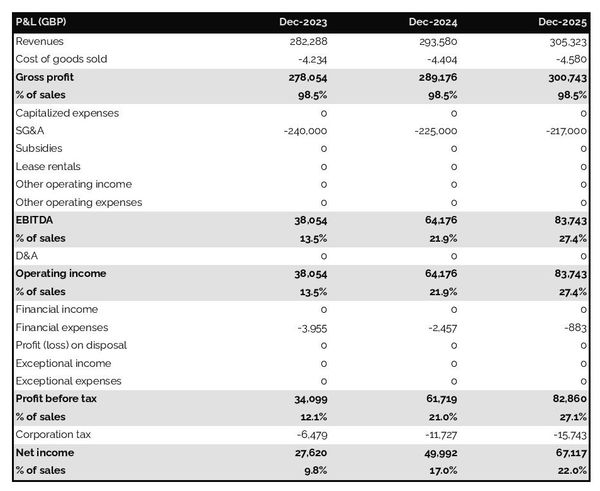
Ideally, your reader will want to see:
- Growth above the inflation level
- Expanding profit margins
- Positive net profit throughout the plan
Expectations for an established event planning company will of course be different than for a startup. Existing businesses which have reached their cruising altitude might have slower growth and higher margins than ventures just being started.
The projected balance sheet of your event planning company
The balance sheet for an event planning company is a financial document that provides a snapshot of your business’s financial health at a given point in time.
It shows three main components: assets, liabilities and equity:
- Assets: are resources owned by the business, such as cash, equipment, and accounts receivable (money owed by clients).
- Liabilities: are debts owed to creditors and other entities, such as accounts payable (money owed to suppliers) and loans.
- Equity: includes the sums invested by the shareholders or business owners and the cumulative profits and losses of the business to date (called retained earnings). It is a proxy for the value of the owner's stake in the business.
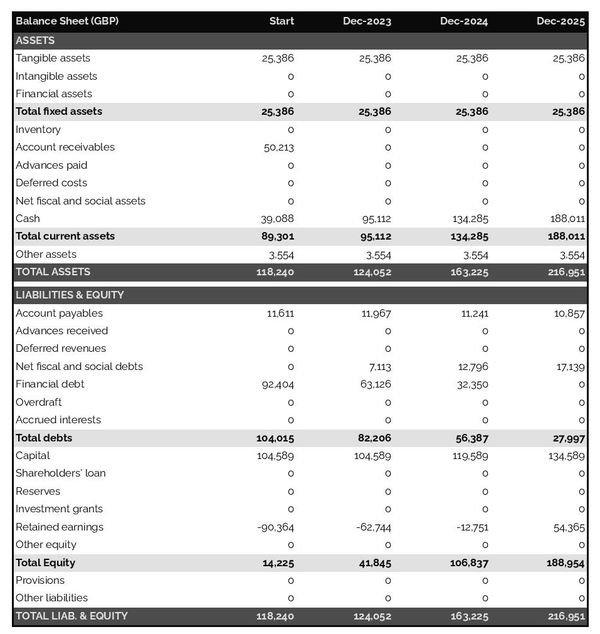
Examining the balance sheet is important for lenders, investors, or other stakeholders who are interested in assessing your event planning company's liquidity and solvency:
- Liquidity: assesses whether or not your business has sufficient cash and short-term assets to honour its liabilities due over the next 12 months. It is a short-term focus.
- Solvency: assesses whether or not your business has the capacity to repay its debt over the medium-term.
Looking at the balance sheet can also provide insights into your event planning company's investment and financing policies.
In particular, stakeholders can compare the value of equity to the value of the outstanding financial debt to assess how the business is funded and what level of financial risk has been taken by the owners (financial debt is riskier because it has to be repaid, while equity doesn't need to be repaid).
The projected cash flow statement
A cash flow forecast for an event planning company shows how much cash the business is projected to generate or consume.
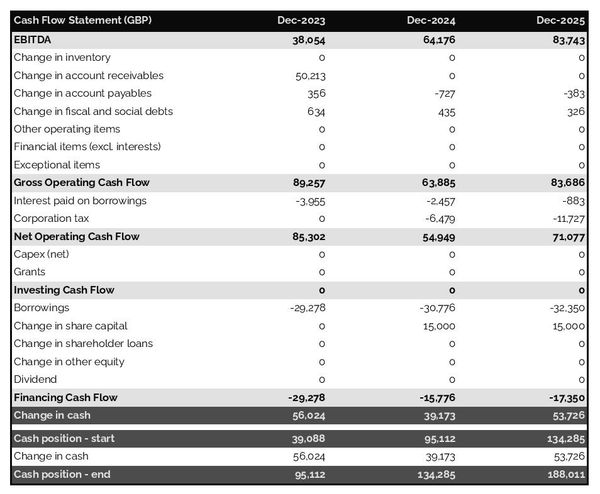
The cash flow statement is divided into 3 main areas:
- The operating cash flow shows how much cash is generated or consumed by the operations (running the business)
- The investing cash flow shows how much cash is being invested in capital expenditure (equipment, real estate, etc.)
- The financing cash flow shows how much cash is raised or distributed to investors and lenders
Looking at the cash flow forecast helps you to ensure that your business has enough cash to keep running, and can help you anticipate potential cash shortfalls.
It is also a best practice to include a monthly cash flow statement in the appendices of your event planning company business plan so that the readers can view the impact of seasonality on your business cash position and generation.
The initial financing plan
The sources and uses table or initial financing plan is a key component of your business plan when starting an event planning company.
It shows where the capital needed to set up the business will come from (sources) and how it will be spent (uses).

This table helps size the investment required to set up the event planning company, and understand how risks will be distributed between the business owners, and the financiers.
The sources and uses table also highlights what the starting cash position will be. This is key for startups as the business needs to have sufficient funding to sustain operations until the break-even point is reached.
Now that you have a clear understanding of what will go into the financial forecast of your event planning company business plan, let's have a look at the written part of the plan.
Need a convincing business plan?
The Business Plan Shop makes it easy to create a financial forecast to assess the potential profitability of your projects, and write a business plan that’ll wow investors.

The written part of an event planning company business plan
The written part of an event planning company business plan plays a key role: it lays out the plan of action you intend to execute to seize the commercial opportunity you've identified on the market and provides the context needed for the reader to decide if they believe your plan to be achievable and your financial forecast to be realistic.
The written part of an event planning company business plan is composed of 7 main sections:
- The executive summary
- The presentation of the company
- The products and services
- The market analysis
- The strategy
- The operations
- The financial plan
Let's go through the content of each section in more detail!
1. The executive summary
The executive summary, the first section of your event planning company's business plan, serves as an inviting snapshot of your entire plan, leaving readers eager to know more about your business.
To compose an effective executive summary, start with a concise introduction of your business, covering its name, concept, location, history, and unique aspects. Share insights about the services or products you intend to offer and your target customer base.
Subsequently, provide an overview of your event planning company's addressable market, highlighting current trends and potential growth opportunities.
Then, present a summary of critical financial figures, such as projected revenues, profits, and cash flows.
You should then include a summary of your key financial figures such as projected revenues, profits, and cash flows.
Lastly, address any funding needs in the "ask" section of your executive summary.
2. The presentation of the company
The second section in your event planning company's business plan should focus on the structure and ownership, location, and management team of the company.
The structure and ownership part provides an overview of the legal structure of the business, who the owners are and how much each has invested and owns. If you are seeking financing it is important that the reader gets a clear picture of which legal entity is receiving the funds, and who controls the business.
The location part should give an overview of the premises from which the company is operating, and why that location is of particular interest (catchment area, accessibility, amenities nearby, etc.).
When describing the location of your event planning company, you could emphasize its potential for success due to its access to a large population base. It may be situated in a metropolitan area with many businesses and a large, diverse population, offering ample opportunities to reach potential customers. You could also highlight its access to public transportation, as well as its proximity to other major cultural and commercial hubs that could attract further business. It may also be close to major highways and airports, providing easy access to the rest of the region. All of these features may make the location of your event planning company ideal for success.
Finally, you should introduce the management team. Explain each member's role, background, and experience.
It is also important to emphasize any past successes that the members of the management team have achieved, and how long they've been working together, as this will help potential lenders or investors understand why they should trust in their leadership.
3. The products and services section
The products and services section of your business plan should include a detailed description of what your company offers, who are the target customers, and what distribution channels are part of your go-to-market.
For example, your event planning company could offer event design, venue selection, and catering services to its customers. Event design could include creating a theme, color palette, and layout for the event that will give the experience a cohesive look. Venue selection could involve finding the optimal space for the customer's needs, such as a large ballroom or an outdoor garden. Catering services could be offered to provide a delicious meal to guests, such as an array of appetizers or a buffet-style dinner. These services could help to create an enjoyable and memorable experience for customers.
4. The market analysis
When presenting your market analysis in your event planning company business plan, you should detail the customers' demographics and segmentation, target market, competition, barriers to entry, and any regulations that may apply.
The goal of this section is to help the reader understand how big and attractive your market is, and demonstrate that you have a solid understanding of the industry.
You should start with the demographics and segmentation subsection, which gives an overview of the addressable market for your event planning company, the main trends in the marketplace, and introduces the different customer segments and their preferences in terms of purchasing habits and budgets.
The target market section should follow and zoom on the customer segments your event planning company is targeting, and explain how your products and services meet the specific needs of these customers.
For example, your target market might include wedding planners. Wedding planners are often looking for creative and unique ideas for their events, making them an ideal customer segment for an event planning company. They also often require assistance with coordinating and executing the events, meaning your services would be of immense value to them. Finally, wedding planners typically have a larger budget for their event planning needs than individuals planning one-off events, making them an attractive customer segment for your business.
Then comes the competition subsection, where you should introduce your main competitors and explain what differentiates you from them.
Finally, you should finish your market analysis by giving an overview of the main regulations applicable to your event planning company.
Need a convincing business plan?
The Business Plan Shop makes it easy to create a financial forecast to assess the potential profitability of your projects, and write a business plan that’ll wow investors.

5. The strategy section
When you write the strategy section of your event planning company business plan, remember to cover key elements such as your competitive edge, pricing strategy, sales & marketing plan, milestones, and risks and mitigants.
In the competitive edge subsection, elaborate on what makes your company stand out from competitors. This becomes especially important if you're a startup, aiming to carve a place for yourself amidst established players in the marketplace.
The pricing strategy subsection should demonstrate how you plan to maintain profitability while offering competitive prices to attract customers.
Outline your sales & marketing plan, detailing how you'll reach out to new customers and retain existing ones through loyalty programs or special offers.
For the milestones subsection, outline your company's achievements to date and your main objectives for the future, complete with specific dates to set clear expectations for progress.
Lastly, the risks and mitigants subsection should address the main risks that could affect your plan's execution. Explain the measures you've put in place to minimize these risks, assuring potential investors or lenders.
Your event planning company faces a variety of risks that could have a negative impact on your business. For example, your clients may not be satisfied with the results of your services and may choose not to use your services in the future. Additionally, your company could face financial risks if you are not able to adequately manage the costs associated with running the business. If you are unable to accurately budget for event costs, you may end up spending more than planned, leading to financial losses.
6. The operations section
The operations of your event planning company must be presented in detail in your business plan.
Begin by addressing your staff, specifying the main roles and your recruitment plan to support the anticipated growth. Outline the qualifications and experience needed for each role and discuss your recruitment strategies, which may involve using job boards, referrals, or headhunters.
Next, clearly state your event planning company's operating hours, allowing the reader to gauge the adequacy of your staffing levels. Additionally, mention any considerations for varying opening times during peak seasons and your approach to handling customer queries outside regular operating hours.
The key assets and intellectual property (IP) required to run your business should also be highlighted. If you rely on licenses, trademarks, physical structures like equipment or property, or lease agreements, ensure they are well-documented in this section.
You may have key assets such as event planning software and a trusted network of vendors. These could help you to manage the planning process more efficiently and ensure that you have access to the best possible resources. Additionally, you might have intellectual property such as event planning templates and other processes that you have developed over time to ensure that each event runs smoothly. These assets and IP could be very valuable to the success of your event planning company.
Finally, provide a comprehensive list of suppliers you intend to collaborate with, along with a breakdown of their services and main commercial terms, such as price, payment terms, break clauses and contract duration. Investors often seek insight into the reasons behind your supplier choices, which may include a preference for higher-quality products or established relationships from past ventures.
7. The presentation of the financial plan
The financial plan section is where we will include the financial forecast we talked about earlier in this guide.
Now that you have a clear idea of the content of an event planning company business plan, let's look at some of the tools you can use to create yours.
Need a convincing business plan?
The Business Plan Shop makes it easy to create a financial forecast to assess the potential profitability of your projects, and write a business plan that’ll wow investors.

What tool should I use to write my event planning company's business plan?
There are two main ways of creating your event planning company business plan:
- Using specialized business planning software,
- Hiring a business plan writer.
Using an online business plan software for your event planning company's business plan
Using online business planning software is the most efficient and modern way to create an event planning company business plan.
There are several advantages to using specialized software:
- You can easily create your financial forecast by letting the software take care of the financial calculations for you without errors
- You are guided through the writing process by detailed instructions and examples for each part of the plan
- You can access a library of dozens of complete business plan samples and templates for inspiration
- You get a professional business plan, formatted and ready to be sent to your bank or investors
- You can easily track your actual financial performance against your financial forecast
- You can create scenarios to stress test your forecast's main assumptions
- You can easily update your forecast as time goes by to maintain visibility on future cash flows
- You have a friendly support team on standby to assist you when you are stuck
If you're interested in using this type of solution, you can try The Business Plan Shop for free by signing up here.
Hiring a business plan writer to write your event planning company's business plan
Outsourcing your event planning company business plan to a business plan writer can also be a viable option.
Business plan writers are skilled in creating error-free business plans and accurate financial forecasts. Moreover, hiring a consultant can save you valuable time, allowing you to focus on day-to-day business operations.
However, it's essential to be aware that hiring business plan writers will be expensive, as you're not only paying for their time but also the software they use and their profit margin.
Based on experience, you should budget at least £1.5k ($2.0k) excluding tax for a comprehensive business plan, and more if you require changes after initial discussions with lenders or investors.
Also, exercise caution when seeking investment. Investors prefer their funds to be directed towards business growth rather than spent on consulting fees. Therefore, the amount you spend on business plan writing services and other consulting services should be insignificant compared to the amount raised.
Keep in mind that one drawback is that you usually don't own the business plan itself; you only receive the output, while the actual document is saved in the consultant's business planning software. This can make it challenging to update the document without retaining the consultant's services.
For these reasons, carefully consider outsourcing your event planning company business plan to a business plan writer, weighing the advantages and disadvantages of seeking outside assistance.
Need a convincing business plan?
The Business Plan Shop makes it easy to create a financial forecast to assess the potential profitability of your projects, and write a business plan that’ll wow investors.

Why not create your event planning company's business plan using Word or Excel?
I must advise against using Microsoft Excel and Word (or their Google, Apple, or open-source equivalents) to write your event planning company business plan. Let me explain why.
Firstly, creating an accurate and error-free financial forecast on Excel (or any spreadsheet) is highly technical and requires a strong grasp of accounting principles and financial modelling skills. It is, therefore, unlikely that anyone will fully trust your numbers unless you have both a degree in finance and accounting and significant financial modelling experience, like us at The Business Plan Shop.
Secondly, relying on spreadsheets is inefficient. While it may have been the only option in the past, technology has advanced significantly, and software can now perform these tasks much faster and with greater accuracy. With the rise of AI, software can even help us detect mistakes in forecasts and analyze the numbers for better decision-making.
And with the rise of AI, software is also becoming smarter at helping us detect mistakes in our forecasts and helping us analyse the numbers to make better decisions.
Moreover, software makes it easier to compare actuals versus forecasts and maintain up-to-date forecasts to keep visibility on future cash flows, as we discussed earlier in this guide. This task is cumbersome when using spreadsheets.
Now, let's talk about the written part of your event planning company business plan. While it may be less error-prone, using software can bring tremendous gains in productivity. Word processors, for example, lack instructions and examples for each part of your business plan. They also won't automatically update your numbers when changes occur in your forecast, and they don't handle formatting for you.
Overall, while Word or Excel may seem viable for some entrepreneurs to create a business plan, it's by far becoming an antiquated way of doing things.
Takeaways
- Using business plan software is a modern and cost-effective way of writing and maintaining business plans.
- A business plan is not a one-shot exercise as maintaining it current is the only way to keep visibility on your future cash flows.
- A business plan has 2 main parts: a financial forecast outlining the funding requirements of your event planning company and the expected growth, profits and cash flows for the next 3 to 5 years; and a written part which gives the reader the information needed to decide if they believe the forecast is achievable.
We hope that this in-depth guide met your expectations and that you now have a clear understanding of how to write your event planning company business plan. Do not hesitate to contact our friendly team if you have questions additional questions we haven't addressed here.
Also on The Business Plan Shop
- How to write a business plan to secure a bank loan?
- Business plan vs business proposal
- R&D in business plans
- Internal plan and business plan: how do they differ
- Key steps to write a business plan?
- Top mistakes to avoid in your business plan
Do you know entrepreneurs interested in starting or growing an event planning company? Share this article with them!


